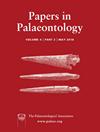古生代苔藓虫的软组织化石
IF 2.2
2区 地球科学
Q1 PALEONTOLOGY
引用次数: 0
摘要
三种古生代苔藓虫的薄片显示了软组织化石,显示了有机角质层和内部结构如膜囊和肠道的位置。化石的形成显然是由于缺氧条件下的快速埋藏。二叠纪龟背体菱锥虫(Rhombotrypella superangustata)中膜囊的位置表明了一个渐进的多肽循环。在奥陶系葡萄树中,多角形位于上半球和内半球的后面,表明其具有保护功能。本文章由计算机程序翻译,如有差异,请以英文原文为准。
Fossilized soft tissues in Palaeozoic bryozoans
Thin sections of three Palaeozoic bryozoans reveal fossilized soft tissues that show the position of organic cuticle and internal structures such as the membranous sac and gut. The fossilization occurred apparently due to fast burial under anoxic conditions. The position of a membranous sac in the Permian trepostome Rhombotrypella superangustata is indicative of a progressive polypide cycle. The position of the polypide in the Ordovician Graptodictya delicata behind the superior and interior hemisepta suggests a protective function of the hemisepta.
求助全文
通过发布文献求助,成功后即可免费获取论文全文。
去求助
来源期刊

Papers in Palaeontology
PALEONTOLOGY-
CiteScore
4.50
自引率
4.30%
发文量
55
期刊介绍:
Papers in Palaeontology is the successor to Special Papers in Palaeontology and a journal of the Palaeontological Association (www.palass.org). The journal is devoted to the publication of papers that document the diversity of past life and its distribution in time and space.
Papers in Palaeontology is devoted to the publication of papers that document the diversity of past life and its distribution in time and space. As a sister publication to Palaeontology its focus is on descriptive research, including the descriptions of new taxa, systematic revisions of higher taxa, detailed biostratigraphical and biogeographical documentation, and descriptions of floras and faunas from specific localities or regions. Most contributions are expected to be less than 30 pp long but longer contributions will be considered if the material merits it, including single topic parts.
The journal publishes a wide variety of papers on palaeontological topics covering:
palaeozoology,
palaeobotany,
systematic studies,
palaeoecology,
micropalaeontology,
palaeobiogeography,
functional morphology,
stratigraphy,
taxonomy,
taphonomy,
palaeoenvironmental reconstruction,
palaeoclimate analysis,
biomineralization studies.
 求助内容:
求助内容: 应助结果提醒方式:
应助结果提醒方式:


